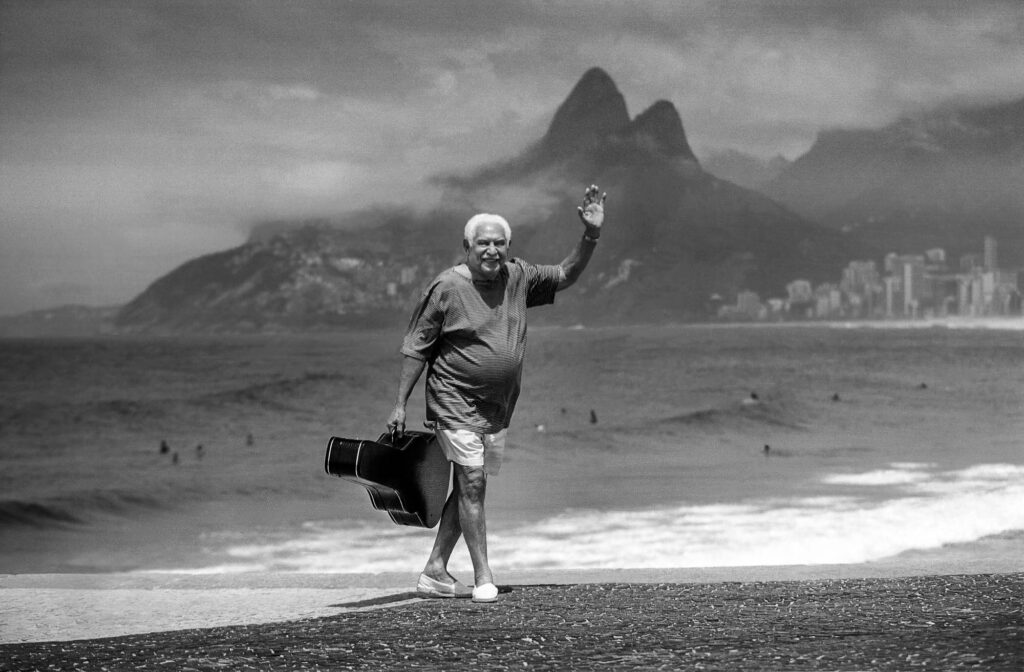Dorival Caymmi, one of the most important singers and composers of Brazilian popular music, was born in Salvador, Bahia, on April 30, 1914. Caymmi was influenced by black music and Bahian culture, which permeated his work, and is recognized for having presented samba with the habits, traditions and customs of the people and the Bahian landscape. He was a great friend of two other artists, Carybé and Jorge Amado.
In addition to being a composer, Caymmi was also a talented singer and guitarist. His low, smooth voice was perfectly suited to the songs he wrote, and he was known for his unique guitar strumming technique, which became a hallmark of his sound.
Caymmi also acted as painter and actor, having participated in some films and theater plays throughout his career. His pictorial work is as important as his music, having been exhibited in several art galleries around the world.
In this article, we will explore Caymmi's life and work, from his debut as a freshman on Rádio Tupi, in 1938, until his death in 2008, passing through his main compositions and his influence on Brazilian music.
Dorival Caymmi's debut on Radio Tupi
On June 24, 1938, Dorival Caymmi he was introduced to the director of Rádio Tupi and debuted on the radio singing two compositions, although still without a contract. He did well as a freshman and started singing two days a week, in addition to participating in the Dragão da Rua Larga program. This was the beginning of the career of one of the most important Brazilian musicians.
The influence of Bahian culture on Caymmi's work
Caymmi was deeply influenced by Bahian culture and black music, which was reflected in his compositions. He sang about the sea, popular festivities, religiosity and everyday life in Bahia. His songs portrayed the local culture and helped spread Bahian music throughout Brazil and the world.

Main compositions by Dorival Caymmi
Dorival Caymmi left a musical legacy that is still recognized today and goes far beyond “É Doce Morrer No Mar”. Some of his most famous compositions include:
What does Bahia have?
This 1939 song has become a classic of Brazilian music and is one of Caymmi's best known. The lyrics talk about the qualities of Bahia women, who enchant everyone with their beauty and friendliness.
Maracangalha
This song, released in 1955, also became a huge hit. She talks about a city in the interior of Bahia called Maracangalha, and shows the importance of music and joy in the lives of the people of the region.
Missing Bahia
Released in 1957, this song talks about the longing that Caymmi felt for her homeland, Bahia. It is one of the composer's most moving songs, and shows his deep connection with his land and culture. The song became more famous for current generations through a version of “Novos Baianos”.
My Land Samba
This song from 1956 is a tribute to the city of Salvador, where Caymmi was born. It is one of the composer's most famous songs, and is considered a hymn to Bahia.
THE INFLUENCE OF DORIVAL CAYMMI ON BRAZILIAN MUSIC
Dorival Caymmi had an enormous influence on Brazilian music, having been one of the first composers to incorporate Bahian musical traditions into his work. His songs are a unique mix of Afro-Brazilian rhythms, such as samba, lundu and maracatu, with European and American influences.
Caymmi was also one of the pioneers in using themes related to Afro-Brazilian culture in his music, such as religiosity, life in black communities and the fight against racial prejudice. Their lyrics were poetic and profound, and often made social commentary disguised as love songs.
Dorival Caymmi's work influenced many other Brazilian artists, including Gilberto Gil, Caetano Veloso and Gal Costa. Its influence can be heard in many Brazilian musical genres, such as MPB, samba, forró and samba-canção.
Furthermore, Caymmi's work also had a significant impact on Brazilian culture as a whole. His songs became part of the country's collective imagination, and are often used in films, soap operas and television programs. His cultural legacy is undeniable, and his music continues to be a source of inspiration for many Brazilian artists.

LEGACY OF DORIVAL CAYMMI
Dorival Caymmi passed away in 2008, aged 94, leaving behind an impressive body of work that influenced Brazilian music for more than seven decades. His legacy includes more than 20 studio albums, countless iconic compositions and interpretations, as well as a great contribution to Brazilian culture as a whole.
Caymmi was one of the most important artists in Brazilian popular music, and his legacy continues to inspire generations of musicians and music lovers around the world. His work is an enduring testament to the richness and diversity of Brazilian culture, and his contribution to music and art is invaluable.
COMMON QUESTIONS
Dorival Caymmi was a Brazilian singer, songwriter and musician who was born in Salvador, Bahia, in 1914 and died in 2008. He is considered one of the greatest composers of Brazilian music, with a musical style that blends the tradition of northeastern popular music with jazz and bossa nova. His work influenced many other artists and generations and he is recognized as one of the icons of Brazilian music.
Dorival Caymmi's legacy is very important for Brazilian music. He was one of the first artists to bring Northeastern culture to Brazilian popular music, with his songs portraying the life and traditions of Bahia. He also influenced many other artists and generations, such as João Gilberto and Tom Jobim, who were inspired by his musical style to create bossa nova.
Some of the most famous songs by Dorival Caymmi are “What does Baiana have?”, “Maracangalha”, “Doralice” and “Samba da Minha Terra”. His inspirations for creating them were the culture and traditions of Bahia, where he grew up and developed musically. In his songs, he portrayed the daily life and landscapes of Bahia, with its beaches, festivals and typical food.
Dorival Caymmi's wife was Stella Maris, a former singer from Minas Gerais. The two met on Rádio Nacional at the end of the 1930s and were married on April 30, 1940, when Dorival turned 26. Together, they had three children: Nana, Dori and Danilo, who are also singers, as well as their granddaughters Juliana and Alice. Stella Maris died on August 16, 2008, aged 86, about ten days after the death of Dorival Caymmi, and it is believed that her illness has worsened the musician's health.





1 thought on “dorival caymmi, vida e obra: 109 anos”